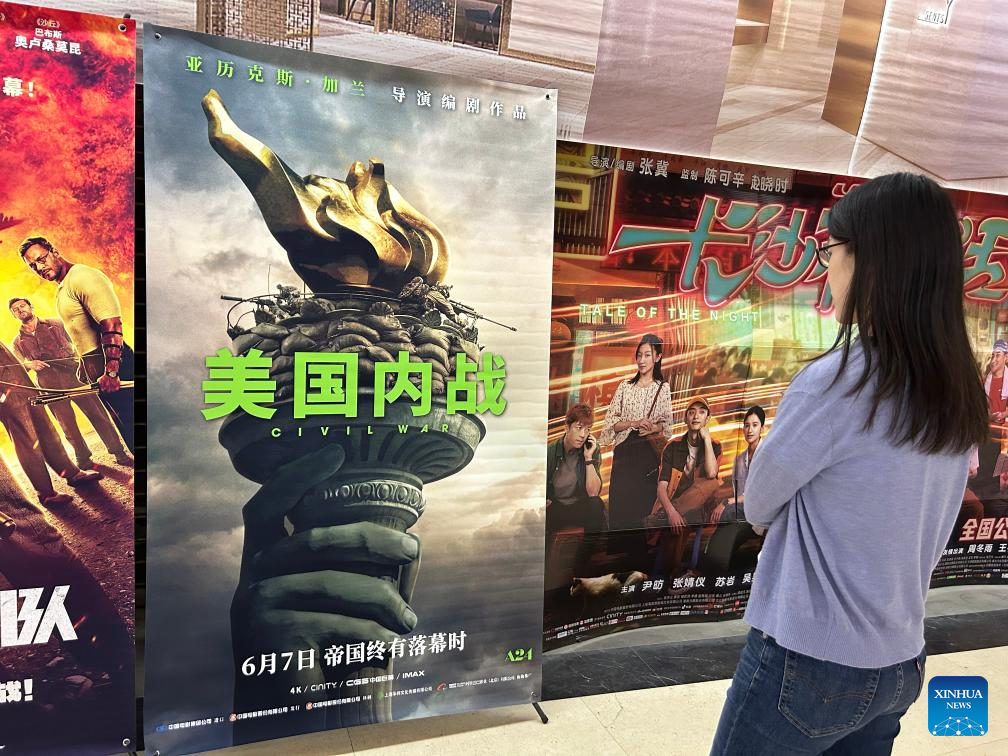
A person views a poster of the U.S. movie "Civil War" in Beijing, capital of China, May 24, 2024.(Xinhua/Shen Anni)
BEIJING, May 24 (Xinhua) -- "Civil War," a dystopian movie produced by a U.S. indie studio that alludes to political and social divide in the United States, is scheduled to land in movie theaters on the Chinese mainland on June 7.
According to a post by China Film Co., Ltd., the movie's distributor, on the microblogging site Weibo on May 16, the movie will be released one day before the three-day Dragon Boat Festival holiday, setting it up for tough competition from domestic productions such as the drama "Lai Fu Da Jiu Dian," or "Life Hotel."
Since the movie premiered in the U.S. market in April, many Chinese have shown great interest in it. One trailer released about a week ago by "Film American 'Civil War'," one of the official Chinese accounts marketing the film, has clocked up around 1.9 million views on Weibo. Another trailer, hosted on the video platform Bilibili, has been played over 1.3 million times, and counting.
One reason for the popularity of "Civil War" among Chinese moviegoers is its political theme, according to industry observers.
Under an import quota system for films, the introduced American films in China have mainly focused on genres such as adventure and science fiction, with political films making up a small proportion of imports, said Zhang Yiwu, a professor at Peking University. Therefore, a political film like "Civil War" soon gained attraction, he added.
Set in the near-future, the movie, written and directed by Alex Garland, follows a group of reporters who travel across the United States as a rapidly escalating civil war engulfs the nation. It features stars including Kirsten Dunst and Wagner Moura.
For many Chinese, "Civil War" offers a window into the contemporary issues in American politics and society.
"I've seen reports in the media about the divisions and conflicts within the U.S. society. It would be interesting to watch how Americans see these problems themselves," said Zhou Ruoqi, a 29-year-old employee of a marketing company.
The New York Times reported that the film taps into "a dark set of national anxieties that took hold after the Jan. 6, 2021, storming of the Capitol."
The newspaper went on to detect a "bipartisan sense of unease" that has permeated American politics," and the "violence and chaos that subtly and overtly pervades American politics," citing "violent threats against members of Congress" and "reports of hate crimes in the country's largest cities" have reached record levels.
"Although many Chinese have already learned about the complex issues in American society through media coverage, they hope to observe more about the situation in America and its attitude toward China through this movie," said Zhang.
His view was shared by Sun Chenghao, a fellow at the Center for International Security and Strategy, Tsinghua University, who believes more Chinese people will come to realize the complicated situation in America through "Civil War," an exaggerated artistic work rooted in reality.
Rather than addressing its own problems, the United States is distracted by attempting to "solve" the perceived "ills" in other countries, one internet user named "Heruiyaojiayou" commented on Weibo.
Dubbed by some American media as potentially "the year's most explosive movie," "Civil War" has secured a victory in theaters, taking the top spot at the North American box office chart for two consecutive weekends.
The screening of "Civil War" on the Chinese mainland follows a number of American productions or joint productions already released this year, including the MonsterVerse mashup "Godzilla x Kong: The New Empire," the animated film "Kung Fu Panda 4," and the sci-fi "Kingdom of the Planet of the Apes."
"I forecast that 'Civil War' will perform well," Zhang said, stopping short of predicting a blockbuster turnout as he did not expect sensational ticket sales.
In recent years, Hollywood movies' appeal is waning among Chinese people while increasingly diverse, high-quality domestic films have gained in popularity. "Although they present visually impactful spectacles, over time, Chinese audiences have also grown weary of them," said Rao Shuguang, president of the China Film Critics Association. ■



